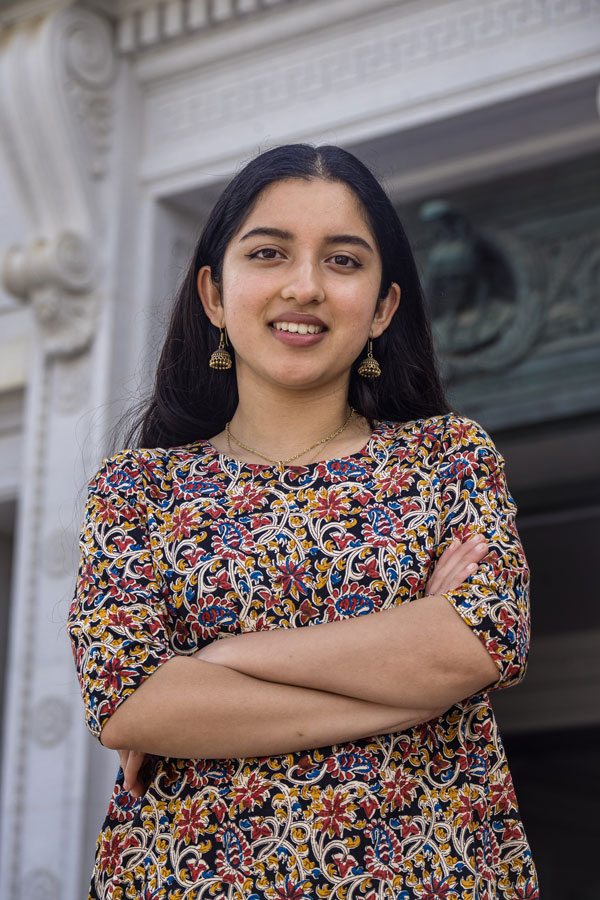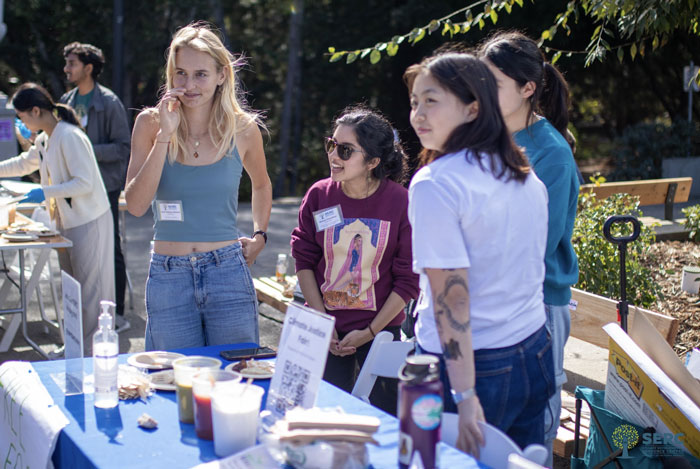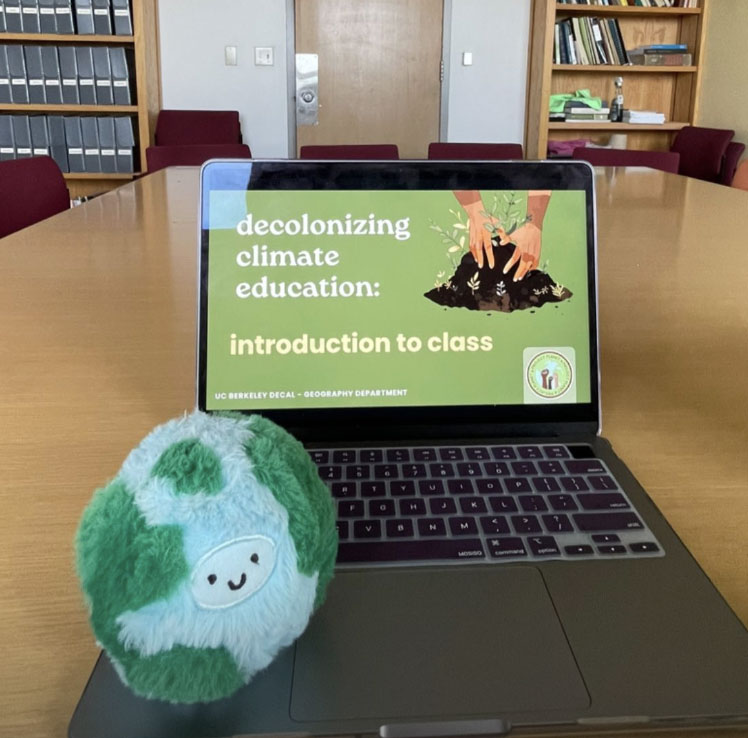
Third-year environmental science and human geography student Shreya Chaudhuri is passionate about bringing action-based and youth-centered climate education to schools.
This summer, Chaudhuri was named part of the first Millennium Fellowship cohort hosted at UC Berkeley. Run in partnership between the Millennium Campus Network and the United Nations Academic Impact initiative, the semester-long program offered students an opportunity to build their leadership skills while advancing the organization’s Sustainable Development Goals.
To complete her fellowship, Chaudhuri developed a student-led course that sought to decolonize climate education through the Democratic Education at Cal (DeCal) program. The course offered students an opportunity to learn more about Indigenous environmental knowledge and history while examining how these practices could help address modern-day climate challenges.
We spoke to Chaudhuri about her background, the fellowship program, and her time at Berkeley.
This conversation has been edited for length and clarity.
Why did you choose Rausser College?
I’ve been interested in the environment since I was a kid. I remember helping my mom in her garden, going on road trips to the nearby redwood forests, and experiencing new natural environments when visiting my family in India. I didn't think about pursuing a career related to the environment until high school when I saw the impact of the California wildfires and the cyclones in India. I had the chance to intern in the lab of Environmental Science, Policy, and Management professor Celine Pallud one summer, which was a great experience and an opportunity I’m grateful for. While researching colleges, I realized just how strong UC Berkeley is in environmental science, not just in terms of the programs here but also how alive and active the student body is in engaging with environmental and social action. I visited again with that mindset and fell in love with the nature and the culture of the campus and the city.
Can you tell us more about the Millennium Fellowship program?

The fellowship is sponsored by the Millennium Campus Network and the United Nations Academic Impact initiative and prioritizes social work and social impact to help make the Sustainable Development Goals a reality. Each person in the program has to complete a fellowship project. For mine, I worked with my friend Jessalyn Fong to develop a DeCal class focused on decolonial climate education.
In high school, I started Project Planet, a non-profit that mostly focused on bringing action-based and youth-centered climate education to schools. But coming to college was an adjustment. I didn’t have the time to focus on it, and it also felt like I could do more. During a family trip to India last January, I started thinking more about how the root of the climate crisis is colonization, and without addressing this origin and the reasons behind the disproportionate impact on BIPOC communities, we will never solve the climate crisis. There are so many different Indigenous climate solutions that can be implemented, so we look towards Traditional Ecological Knowledge to reframe how we imagine the new world we can build. After learning more about those solutions, I wanted to switch Project Planet’s focus to decolonial environmental education. Jessalyn reached out after I mentioned I was working on that project and together we developed our DeCal that focuses on Traditional Ecological Knowledge and decolonial history.
What were some of the topics your class covered?
Our class focused on the link between climate change and colonialism, especially in the Majority World (Africa, Asia, Oceania, and the Americas). Mainstream and current environmental education doesn’t focus on or center Indigenous voices—both in terms of solutions and ecological knowledge. And there tends to be this attitude that countries here are naturally poor, but in reality, it wasn’t always like that. There were so many extractive and intentional processes that caused these conditions.
Covering global Traditional Ecological Knowledge and History through a BIPOC lens is crucial to understanding how we can revive our ecosystems and communities while reflecting on institutions like capitalism and colonialism and how they have damaged our relationship with nature and each other. By sharing this knowledge with Berkeley students, we hope to shape the actions of future environmentalists in navigating potential environmental solutions from an equitable perspective.

What was your experience developing and facilitating the class?
It was incredibly rewarding and something I'm grateful to have had the opportunity to do. The DeCal program at Berkeley is empowering because it gives students agency over their education. The conversations we had in that classroom are not ones I've had in other classes here, which gave me a sense of purpose to know that we're facilitating a unique space. Facilitating a class where our priority is to encourage more BIPOC-led climate action and deconstruct colonial narratives was personally fulfilling because we were creating the space we wanted at Berkeley. It was important to us that we aren’t just centering loss but what we can build.
We’re also looking forward to continuing to build the class. We had just 15 students this past semester, but we hope to have up to 100 this semester. Jessalyn and I have also grown our team; this semester, we asked more people to join our team at Project Planet. We’re very excited to see how that takes shape, as it will help us facilitate more conversations and host more activities.
Are there any faculty or staff who have supported you during your time at Cal?
Last year, I took Global Environmental Politics with Diana Negrin, a lecturer in the Geography Department. She brought marginalized communities to the forefront of her lectures, for which I was grateful because I rarely saw this in other environmental classes here, and I appreciate that she agreed to be the faculty sponsor for our DeCal. Sharon Daraphonhdeth, who’s my boss at SERC, is also an incredible and supportive person. She’s helped guide us through the process of developing our own leadership qualities.
Are there other groups you’re involved with on campus?

I was a student intern with an environmental engineering lab, used to work with Berkeley Student Farms, and have been involved with the Students of Color Environmental Collective (SCEC) for several years. With them, I’ve planned different community events for students of color in the environmental field. SCEC has provided a space on campus that doesn't make us feel isolated, knowing how white-dominated the environmental field can be. I’m also a Climate Action Engagement Fellow with the Student Environmental Resource Center (SERC). The fellowship is a joint initiative supported by the UC Office of the President to create more student involvement in UC climate policy. It’s very empowering to be in this position; before this, I had no idea what was happening with UC climate policy, but now that I’m in the room, I can make more space for other students to be involved as well. So far at Berkeley, we've hosted SERC’s first Climate Justice Fair and hope to host more equity-centered student engagement opportunities.
I’m also doing the Conservation and Innovation track through the Fung Fellowship. Because I’m a data science minor, I thought this would be a really great opportunity to connect technology with conservation. So far, there have been some really exciting opportunities to connect the two fields in practical ways that help people. We just worked on a design challenge where we were paired with Castlemont High School in Oakland to create an Indigenous learning garden. We’re comparing Indigenous practices like Hopi dry farming on one side of the garden to Western farming practices used on the other side. I’m excited to see what organization we’ll be matched with.
Do you know of a student or group in Rausser College involved in noteworthy research, community outreach, or extracurricular activities? Let us know by submitting a suggestion with this nomination form.
